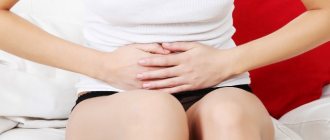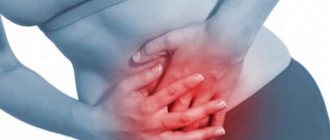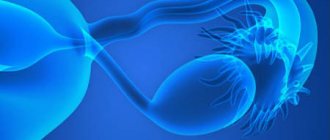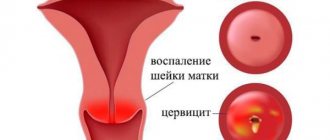A painful sensation in the lower abdomen can be pathological or physiological in nature. Sometimes you need to see a doctor and start treatment immediately. Ignoring symptoms when pathology is suspected is dangerous. If your stomach hurts a week before your period, you should also suspect pregnancy. The condition is accompanied by nagging discomfort. Also, a symptom can be a manifestation of a disease, including the intestines or reproductive organs. A woman may also complain of additional symptoms such as bloating, nausea, and increased sensitivity of the mammary gland.
Often before menstruation, girls have tightness in the lower abdomen
Why does my stomach hurt a week before my period?
7 days before menstruation, doctors recommend reducing the load on the body. Exercises can be performed, but in limited quantities. If the patient neglects the rules, nagging pain forms in the lower abdominal region.
The causes of pain associated with genital diseases are identified:
- infection with an infectious agent of a bacterial or viral nature (usually sexually transmitted diseases);
- inflammation of the uterus and appendages;
- spasm of the uterine muscles or vascular endothelium caused by an increase in the amount of hormones and fluid redistribution;
- pregnancy that the patient is unaware of;
- ectopic pregnancy leading to a threat to health and life;
- cervical endometriosis with a risk of malignant degeneration;
- cysts, abscesses in the ovaries.
There are other formations near the pelvic organs. Pathology can also begin in them, forming negative symptoms. For example, inflammatory diseases of the digestive tract
The most dangerous are peptic ulcers of the stomach and duodenum. It is formed due to infection with Helicobacter pylori. This is a microbe that forms erosions and ulcers on the surface of the mucous membrane.
Gradually they reach the muscle layer with the formation of perforations and peritonitis. Defects appear on the walls of the stomach and intestines. Discomfort and pain appear, worsening your well-being. If you have problems, contact a gastroenterologist.
For differential diagnosis, the following tests are performed:
- general clinical studies of biological fluids;
- Ultrasound of the abdominal cavity and pelvis;
- gastroscopy;
- colposcopy;
- bacteriological culture, virological studies (PCR, ELISA).
Once the problem is identified, treatment begins. During the process, tests are repeated to monitor the development of the disease and not to worry about it.
What are the physiological causes of pain?
The main root cause of physiological discomfort that does not require treatment is hormonal changes caused by the imminent arrival of menstruation. Progesterone rises rapidly closer to ovulation, and drops shortly before menstruation. Unpleasant sensations are caused by a lack of female hormones.
Before menstruation, the level of the so-called joy hormone - endorphin - decreases. This provokes irritability and painful sensations.
Another reason is natural swelling of the uterus. The electrolyte balance is also disturbed due to the presence of excess fluid in the body.
Abdominal discomfort before your period may be the first sign of pregnancy
If discomfort is accompanied by a small amount of blood, you should remember the medications you are taking. Typically, such clinical manifestations are the result of starting to take hormonal contraceptives. The condition will normalize on its own in the next few months.
Another cause of discomfort is pregnancy. The first symptoms of successful fertilization usually appear earlier than the delay. In this case, you should pay attention to the overall clinical picture and wait for the expected date of menstruation.
If your period has not arrived, take a pregnancy test. This should be done immediately after waking up. A more reliable way is a blood test or transvaginal ultrasound. If you are pregnant or suspect a successful conception, taking any therapeutic measures to eliminate pain is strictly prohibited, as it can harm the baby or even cause a miscarriage.
A blood test will help to accurately determine pregnancy.
How does your stomach hurt a week before your period?
When pain is provoked by natural factors, the lower abdomen pulls, but not much. There are no other negative symptoms leading to a deterioration in well-being. All other parts of the body are normal.
In this case, doctors advise taking an antispasmodic tablet, for example, Spazgan, Spazmalgon. Apply a heating pad and take a hot bath. No other action is required.
If the pain is caused by inflammatory pathologies of the genital organs, systemic treatment is required. The woman's health is deteriorating. It is difficult for her to move and get out of bed. Patients characterize the condition as acute. Antibacterial and antiviral therapy is used.
If the pain becomes severe, the following medications are used:
- steroids for excessive inflammation, autoimmune processes;
- NSAIDs are used to reduce pain, inflammation, hyperthermia;
- droppers to replenish the missing fluid in the body, which contains sodium, potassium, magnesium, other useful microelements, vitamins;
- antibiotics, antiviral, antifungal drugs to destroy infection.
Polycystic ovary syndrome and extensive endometriosis require surgery. Otherwise, complications occur that increase the discomfort. They become sharp, cutting, piercing.
How to reduce pain
The most common option for eliminating pain is taking painkillers. Usually women are recommended No-Shpu or Spazmalgon. Drugs should only be used as a last resort. It is advisable to first consult a doctor to exclude contraindications and possible side effects.
People often practice treatment with herbal infusions.
Among traditional methods, the use of herbal infusions is recommended. A natural drink can be prepared using mint, chamomile and lemon balm. The girl also needs to reduce physical activity and rest as much as possible.
Hot baths for abdominal pain are prohibited. Also, the intensity of discomfort depends on nutrition. If you have an unpleasant symptom, you should at least temporarily exclude from the diet:
- alcoholic drinks;
- fat;
- fried;
- spicy.
Doctors recommend doing yoga. This is beneficial for the female body on any day of the menstrual cycle.
You should be careful when treating pain. Severe discomfort localized in the abdomen may indicate appendicitis. An inflamed appendix must be surgically removed immediately. Otherwise, the formation will rupture, and fluid entering the peritoneum will provoke peritonitis.
Watch this video to learn more about the causes of pain before your period:
A warm heating pad placed on the stomach helps to cope with the pain. However, this is recommended only if the symptom is due to approaching menstruation. Otherwise, the treatment method can be dangerous and accelerate the pathological process.
It has been proven that discomfort can be eliminated by taking birth control pills. Pre-obligatory consultation with a doctor.
What does dull, pulling, point or cutting pain indicate?
Every fifth woman in the world experiences difficult menstruation. The reasons for this are various. They can simply cause discomfort or seriously affect your health.
Menstruation begins as a result of the natural renewal of the endometrium, the lining of the uterus. Dead and no longer needed epithelium is removed by contracting its muscles.
Involuntary compression of blood vessels and nerve endings occurs, which causes an aching sensation in the lower abdomen.
Painful symptoms appear before the onset of menstruation and continue to bother you in the first two days after their onset. Additional discomfort is felt in the sacrum and lower back. Such symptoms are natural and familiar. They pass quickly, without causing severe suffering to their owner.
Other pain that occurs during this period indicates pathology - dysmenorrhea. This is the name for severely painful menstruation. In some cases, it requires a special approach and a course of treatment.
Dysmenorrhea occurs in two forms:
- Primary. Associated with functional changes in the female body. It begins to appear approximately two years after the girl reaches puberty, when the cycle normalizes and ovulation becomes regular. The degree of discomfort decreases after the birth of the first child. The reasons may include other changes in the body that are not related to diseases. These include: the use of an IUD, abortion and the adhesions and scars that result from it, and incorrect location of the uterus. Inactivity becomes a provoking factor in the development of dysmenorrhea.
- Secondary. This is dysmenorrhea that appears over the years. Its occurrence is associated with pathological disorders in the genital organs and the course of diseases. Often the deviations have a vegetative-vascular orientation, which is expressed by increased sweating and dizziness. Disturbances in the normal functioning of the heart: tachycardia, arrhythmia - can also cause the development of secondary dysmenorrhea. Other possible reasons for its development include endometriosis, fibroids, pelvic inflammation, and ectopic complicated pregnancy. Severe pain is caused by polyps and cystic formations in the uterus. Acquired dysmenorrhea is especially common in women over thirty years of age.
Taking into account the characteristics of pain, dysmenorrhea is distinguished into four types:
- Zero. Mild painful symptoms. No painkillers are required.
- First. Aching, nagging, but tolerable pain. Accompanied by depressive mood, migraines, and disorders of the digestive organs. The analgesic completely eliminates the discomfort.
- Second. The attacks are prolonged and severe. The woman feels weak, dizzy, chills, and nausea. Anger and irritation appear. Pain medication and sedatives provide relief.
- Third. Acute contractions are concentrated in the lower abdomen three days before menstruation and continue until its end. The body temperature rises, the head is squeezed in a vice. Tachycardia, irregular heart rhythms increase, and a possible feeling of pinching in the heart. Performance is lost. The general condition in the complex can lead to fainting. Analgesics do not correct the situation.
Unpleasant sensations have a different symptomatic character: pulling, stabbing, cutting, contractions. Their occurrence is also caused by factors beyond a person’s control.
Heredity, increased sensitivity to changes, vitamin deficiency, hormonal imbalance. There are many conditions that affect the nature of menstruation. It is important to determine when specialist intervention is required.
Can you trust the first symptoms of pregnancy?
On the other hand, many women do not experience any special symptoms during the first days or even weeks of pregnancy. Therefore, the absence of the above symptoms does not mean that the woman is not pregnant. In addition, many of the above signs may not indicate conception at all, but diseases, both gynecological and diseases of internal organs. Therefore, you cannot completely rely on these signs. Much more reliable evidence of pregnancy is tests and tests, as well as the absence of regular menstruation.
When to urgently go to the hospital
Abnormal uterine bleeding syndrome becomes a signal for mandatory seeking medical help.
This condition can be identified by the following symptoms:
- Duration. Menstruation lasting more than seven days is a deviation from the norm.
- Decreased vitality. Depressant effect on performance, increased fatigue, spasmodic attacks, nausea.
- Intensity. Excessively copious discharge, when hygiene products have to be changed hourly or even more often, signals an anomaly. The condition is uncomfortable and poses a risk of high blood loss, which can lead to the development of anemia.
- Abundance. Large blood clots measuring four centimeters in diameter present in the discharge are a reason to consult a doctor.
Obvious symptoms of serious disorders are unbearable, difficult to withstand attacks that last more than two days. The woman loses her ability to work and is forced to stay at home.
Abdominal pain, diarrhea, nausea with vomiting are frequent accompaniments of this condition.
High blood loss can be understood by a stabbing sensation in the abdomen, accompanied by dizziness.
Diagnosis of endometriosis in Israel
A gynecologist may suspect the presence of a disease based on the patient’s complaints and physical examination.
After this, the following studies are carried out:
- Gynecological ultrasound. During the study, it is possible to detect only large endometrioid cysts (endometriomas). Small lesions cannot be detected using ultrasound.
- Laparoscopy. This method, which is an endoscopic examination of the abdominal cavity, is the only accurate method for diagnosing endometriosis. During the procedure, tissue samples (biopsy) may be taken and treatment of the disease may be performed.
Painkillers
Dysmenorrhea affects 90% of all women. These are mainly persons aged 18 to 35 years. The pain can be so unbearable that it is impossible to do without taking medications to relieve it. It is impossible to just sit still, they cover the whole body and thoughts. Strength weakens and irritability increases.
Rescue by taking medications:
- non-narcotic analgesics;
- non-steroidal anti-inflammatory drugs;
- antispasmodics.
Non-narcotic analgesic drugs are the weakest of painkillers in their action. They eliminate common menstrual ailments in the stomach.
Basic, frequently used:
- Analgin;
- Spazgan;
- Spasmalgon;
- Baralgin;
- Revalgin;
- Maxigan.
Medicines from the NSAID group are good at soothing discomfort and inhibiting inflammation. To achieve the greatest effect, take them a couple of days before the expected menstruation. Medicines are prescribed if the patient refuses hormonal drugs or there are individual contraindications to such therapy.
The most commonly used non-steroidal drugs:
- Dialrapid. A fast-acting medicine that produces a noticeable effect within five minutes. Drowns out negative sensations of any intensity.
- Ibuprofen. Reduces pressure in the uterus, causing the frequency of its contractions to decrease. Frequency of administration: three times a day, always after meals.
- Ketoprofen. It has a similar effect to Diclofenac. It acts by inhibiting the production of prostaglandins and weakening the contractile movements of the uterus. Take two to four capsules daily. Contraindicated for treatment in patients suffering from gastrointestinal inflammation, liver dysfunction, and hemophilia.
- Naproxen. Take twice a day. Restrictions for use: lactation, bronchospasms, ulcerative lesions of the gastrointestinal tract. Medicines with similar effects: Nalgesin, Sanaprox, Apranax. Pronaxen.
- Indomethacin. Creates an analgesic effect, fights inflammation, and reduces fever. The medicine passes into breast milk, which requires stopping feeding or choosing a different drug.
- Piroxicam. Available in different forms: tablets, capsules, gel, suppositories. The analgesic effect is noticeable after half an hour and lasts up to one day. Relieves fever, inflammation, pain relief.
- Ketolong. It has a high pronounced analgesic activity. Eliminates intense pain.
- Paracetamol. It has a therapeutic effect for mild to moderate aching ailments. Up to four tablets per day are allowed. Contraindications for choosing paracetamol are the presence of alcohol dependence, pathological changes in the liver and kidneys.
- Diclofenac. Reduces the synthesis of prostaglandins. It is not advisable to take Diclofenac for gastrointestinal inflammation or asthma. Take up to three times daily. There are analogues of Diclofenac: Voltaren, Diclovit, Naklofen, Rapten.
The safest NSAIDs, given their side effects, are considered to be Ibuprofen and Paracetamol. Combination medications containing both of these substances are designed to help stop menstrual pain.
These include:
- Khairumat;
- Next;
- Brustan;
- Ibuklin.
Antispasmodics relax the muscle tissue of the uterus. Their action is focused on weakening spasms that occur under the influence of prostaglandins, released in large quantities during menstruation.
A doctor's prescription is not required, but compliance with the instructions is mandatory.
Effective antispasmodics:
- No-shpa. One of the most commonly used medicines. For heart disease, lactose intolerance, and lactation, the use of similar drugs is recommended, including: Unispaz, Spakovin, Spasmonet.
- Drotaverine. Myotropic antispasmodic. Relieves neurogenic and muscle spasms of internal organs. It has a vasodilating effect, which improves the blood supply to tissues.
- Papaverine. Prohibited for glaucoma, heart block.
- Galidor. It has an antispasmodic and sedative effect. Contraindicated if you are susceptible to epileptic seizures.
- Buskopan. Strong medicine.
Side effects of antispasmodic drugs include allergies, nausea, dizziness, migraines, and defecation problems.
Unbearable pain, which cannot be relieved with conventional medications, requires the use of strong medications. They are available in the form of suppositories and tablets.
The most powerful candles:
- Meksalen;
- Efferalgan;
- Miralgan;
- Tylenol;
- Baralgin;
- Akamol-Teva.
Potent tablet drugs:
- Ketanov:
- Ketonal;
- Combispasm;
- Menalgin;
- Nise;
- Novalgin;
- Nurofen;
- Solpadeine;
- Spasmalgon;
- Tempalgin.
Strong painkillers are prescribed by the doctor after an examination and determination of the causes of dysmenorrhea.
Why does the lower abdomen feel tight after childbirth?
Pain can also be one of the manifestations of existing pathological processes. Every disease needs diagnosis. If necessary, conservative or surgical treatment methods are prescribed.
The discomfort may be due to:
- inflammatory process in the pelvis due to infection;
- diseases of the gastrointestinal tract;
- recent trauma or surgery;
- sexually transmitted diseases;
- inflammation of the uterus;
- osteochondrosis;
- colitis;
- congenital anomalies of the development of reproductive organs;
- pyelonephritis.
The presence of a gastrointestinal disease can cause pain.
If you suspect the presence of the listed diseases, consult a doctor immediately.
Preventive measures to prevent pain symptoms
Following a proper diet and lifestyle will help ease abdominal pain and prevent menstrual discomfort.
Basic Rules:
- give up alcohol;
- introduce vitamin C into the diet – lemon;
- on the eve of menstruation, temporarily remove meat and dairy products, fried and salty foods from the diet;
- limit sugar;
- replace tea and strong coffee with vitamin vegetable juices;
- avoid stress;
- take vitamins E and B;
- don't catch a cold;
- To do yoga;
- visit the pool;
- lead an active life.
You should avoid foods that cause bloating. It is recommended to eat chocolate, it is responsible for the production of endorphins in the body. Calcium and magnesium have a beneficial effect on well-being on periodic women's days.
There are other methods, the use of which relaxes tense abdominal muscles, relieves tension and soreness. Their use is effective in the absence of pathologies, when periodic pain is not associated with the presence of a disease.
Basic methods used at home:
- Warm shower. It leads to muscle relaxation and dilation of blood vessels.
- Fetal position. To do this, lying on your side on a plane, you need to press your legs to your stomach.
- Simple physical exercises: bending in different directions, circular rotation of the body.
- Soothing tea made from chamomile or mint herbs with the addition of honey.
- Infused herbs parsley, strawberries.
- Ice in a bag. Apply to the lower abdomen if there is heavy bleeding.
- Massage. Apply with light movements in a clockwise direction, covering the area of the abdomen and lower back. Relieves spasms and relieves muscle tension.
- Sea salt. Relaxing short-term baths with its addition are effective. For the purpose of prevention, they are taken before and after menstruation. Compresses with medicinal salt applied to the lower abdomen are effective on critical days.
- Essential oil. Rub into the area of the sacrum and lower abdomen twice a day. Perform the procedure in advance, two days before the start of discharge and in the next three days.
To prevent dysmenorrhea, visiting the pool is recommended. Swimming relaxes the pelvic muscles and relieves tension. The body produces joy hormones - endorphins.
They have an analgesic effect on humans and reduce sensitivity. It is good to do exercises daily, especially stretching exercises. The muscles become elastic, and menstruation proceeds more calmly.
Diagnosis of endometriosis in Israel
A gynecologist may suspect the presence of a disease based on the patient’s complaints and physical examination.
After this, the following studies are carried out:
- Gynecological ultrasound. During the study, it is possible to detect only large endometrioid cysts (endometriomas). Small lesions cannot be detected using ultrasound.
- Laparoscopy. This method, which is an endoscopic examination of the abdominal cavity, is the only accurate method for diagnosing endometriosis. During the procedure, tissue samples (biopsy) may be taken and treatment of the disease may be performed.
Treatment of endometriosis at the Ikhilov Clinic
For endometriosis, the doctor will prescribe the following treatment to the woman:
- Conservative therapy
Pain-relieving medications (aspirin, acetaminophen, or nonsteroidal anti-inflammatory drugs) can help relieve pain. Hormonal therapy, including oral contraceptives, prevents endometrial growth and bleeding.
- Surgical intervention
The patient may need surgery to treat the tissue causing pain or bleeding.
Examples of such procedures include:
- removal or destruction of endometrial tissue;
- removal of adhesions and connective tissue;
- removal or drainage of cysts;
- removal or destruction of nerve fibers that transmit pain signals;
- removal of the uterus, called a hysterectomy, or removal of the ovaries, also called an oophorectomy. It is worth noting that these methods in Israel are used only in isolated, most severe cases.
Correctly performed surgical treatment of endometriosis allows you to remove overgrown endometrial tissue and preserve the ovaries without damaging healthy tissue.
What does sudden onset pain mean?
An unexpectedly sharp pain, different in strength from what was previously experienced, against the background of monthly female bleeding may be a sign of tumor formation.
Additional symptoms confirming fears include unreasonable weight loss and menstrual irregularities. You should not postpone your visit to a medical facility; it is unsafe for your health and life.
Sharp, sudden contractions often occur during ectopic pregnancy.
Both cases require timely examination by a gynecologist.
How to identify diseases
Only a qualified doctor can determine the true root cause of pain after analyzing the diagnostic results. A woman must undergo the following examinations:
- blood analysis;
- Analysis of urine;
- MRI or CT;
- ultrasound diagnostics.
The gynecologist first performs an initial examination. Additional consultation with a surgeon, oncologist, gastroenterologist, or psychotherapist may be required. Ignoring doctor's recommendations can be dangerous to health and life.
When you don't have to worry
In women, hormonal changes occur frequently, they are inconsistent and unstable, and their levels often change. One week before your period, discomfort often appears.
During menstruation, the rate of progesterone increases greatly, resulting in an effect on the intestines.
If there are problems with the intestines, gas formation occurs, constipation occurs, and the stomach may hurt.
Almost every girl or woman experiences premenstrual syndrome:
- Headache.
- Possible depression.
- Irritation.
- Nausea.
- Lower abdominal pain.
- Drowsiness.
- Fast fatiguability.
Such symptoms are triggered by swelling of the uterus, which is how the body signals that it is possible to conceive a child. All the described signs do not indicate disease, so there is no need to worry.
Additionally, the body’s water-salt balance is disrupted.
In what cases is it necessary to consult a doctor?
A visit to the doctor is required if there are signs of pathologies. In this case, you need to urgently go to the doctor or call an ambulance. The following signs should cause concern:
- intense vomiting with foreign signs;
- bowel dysfunction;
- sharp abdominal pain that does not disappear for a long period of time;
- pain in the abdominal cavity that cannot be eliminated even with painkillers;
- fainting state;
- soreness in the head and dizziness;
- fever;
- blood pressure surges;
- intense increase in body temperature;
Urgent help is needed if you lose consciousness
- lack of appetite; pathological change in body weight;
- itching and burning of the genitals;
- bloody or any other pathological discharge from the vagina;
- bleeding;
- pain when urinating.
All of the above signs are not normal. If they are present, you should not hesitate to visit a medical facility. Otherwise, there is a high risk of complications, such as infertility or even death.
Why does the lower abdomen hurt one or two weeks before the start of menstruation? Doctors give different answers. Often the problem can be solved by adjusting your diet and lifestyle. It will be more difficult to treat the disorder if it is accompanied by the following symptoms:
- The appearance of pathological discharge with an unpleasant smell of rotten herring. Such discharge is a sign of infection.
- Increased body temperature. Fever indicates the presence of serious inflammation.
- Heavy, prolonged menstruation. If earlier your periods lasted 4-5 days, but after the pain appeared below they began to last 7-8 days, it is possible that fibroids or endometriosis have developed in the uterus. Such symptoms are also characteristic of cervical erosion.
- Lack of menstruation. In a situation where the stomach began to ache before the expected period, but the critical days did not appear, it is likely that a pregnancy has occurred, which is under threat.
- Bloody discharge in the middle of the cycle. This happens with various disorders of the genitourinary system.
Could there be a pregnancy?
The characteristic pain in the lower abdomen that accompanies a delay in menstruation is quite capable of serving as the basis for an alleged pregnancy. But there is also a high probability that a delay of several days before menstruation occurred under the influence of external factors, most likely not related to pregnancy. This could be stressful situations, climate change, or previous illnesses.
To confirm these assumptions, you can do a test during the first week, and then be sure to consult a gynecologist. A visit to the doctor will protect a woman from a pathological pregnancy, since ideally the beginning of pregnancy should not cause any discomfort other than nausea.
Nagging pain before menstruation: when to seek help
If the discomfort is so severe that it forces you to take medication, it is worth visiting a specialist and identifying the cause. Especially if the pain has not been observed before, if it is sharp and radiates to other parts of the body.
Causes of severe pain before menstruation:
- Acute infection. Accompanied by weakness, fever, nausea and vomiting, cheesy vaginal discharge, and lower back pain.
- Ectopic pregnancy. The spasm begins on one side and is accompanied by nausea, clouding of consciousness, and bleeding. This condition is life-threatening; you should call an ambulance immediately.
- Endometriosis is a difficult disease to diagnose and is the cause of premenstrual pain in approximately half of cases.
- Bicornuate or curved uterus.
- Myoma.
- Sometimes cramps are not associated with the approaching menstruation; they are caused, for example, by appendicitis, poisoning, colic, dysbacteriosis, intestinal infection, etc.
This condition cannot be tolerated; it can be life-threatening.
Pulling, mild spasms in the lower abdomen can be either a normal physiological condition or a sign of a pathological phenomenon. If the discomfort is severe, then you should definitely consult a doctor and identify its cause.
Why does the lower abdomen feel tight before menstruation? In addition, it often not only hurts, but also swells. This question arises for many women. If a girl decides to lose weight, then such feelings become simply a tragedy. Some people think that since the stomach is swollen, it is dangerous and they need to go to the doctor. Therefore, in order to fully determine why this happens, thereby getting rid of stress and anxiety, you need to determine why your stomach is bloated and hurts. And this usually happens before menstruation. Let us also establish accompanying phenomena.
Why does the stomach become swollen and enlarged?
Everything that happens in the female genital area is associated with hormones. After all, the entire menstrual cycle is tied to this. Since a woman’s hormonal level is constantly in motion, it can be called dynamic. It cannot be clearly established and not fluctuate. Therefore, the fact that the stomach increases is associated with specific hormonal indications. And this affects women’s well-being.
What hormones do you mean? Firstly, progesterone jumps dramatically. Moreover, the second half of the cycle is associated with a constant increase in this hormone. But during menstruation it drops sharply. It is because of this jump that some women experience premenstrual syndrome. You can observe a loss of strength, depression, aggression, pain in the lower abdomen, in the lower back, you notice nausea, bloating, heaviness before menstruation. Appetite often increases.
Why does the stomach swell?
1. This is due to the retention of a large amount of fluid. It is this that affects its volume, and its weight also changes. Therefore, fashionistas may find this something scary, since before menstruation the weight increases. But this does not mean that you need to stop eating right away. Since weighing a couple of kilograms more is quite normal. 2. Another reason can be called anticipation of conception. Since before menstruation, the uterus is enlarged, swollen, and is intended for the embryo with all the necessary nutrients. That’s why I want to eat before my period. 3. The body also lacks serotonin. Due to the lack of this hormone, a woman has an urgent need to restore it. That's why she eats more sweets and starchy foods. Where does the appearance of the tummy come from?
Why does my stomach hurt?
Pain before menstruation bothers many people. They just experience them differently. For some they are more intense than for others. In one case they experience unbearable pain, in the other only slight discomfort. It's not bad that it hurts. It's not scary. Half of women suffer from this. The whole reason is hormones.
Elements such as prostaglandins often cause pain. This occurs in fifty percent of women. Ten percent of them will experience unbearable pain. The whole reason is that the uterus contracts intensively. If you indulge in bad habits, including smoking and alcoholism, the pain intensifies. There is such severe pain that a woman may even lose consciousness, and her blood pressure may drop. In this case, pathological algodismenorrhea is observed. Contact your doctor.
Why does my stomach feel tight before my period?
Let’s also dwell on why the stomach feels tight before menstruation. In this case, the conversation will be about pleasant things. Because pregnancy is possible. How can we find out for sure, without tests? Observe many signs.
1. There is a delay. 2. But even before her, the woman knows that she is pregnant. One of the reasons is that the stomach is pulled down, but there is no period.
Such phenomena occur in women in the earliest stages of pregnancy. This is due to the fact that the body stores nutrients that will be used by the future embryo. Since they accumulate, the stomach feels tight before menstruation. Time passes, but no menstruation. If they never started, and then time and a delay passed, then you are pregnant. Such sensations clearly indicate pregnancy before a delay.
So, we have found out a number of reasons why the stomach swells. The whole reason is swelling and pain. Therefore, know that this is not dangerous, and does not mean that you have gained weight. This phenomenon does not spoil the figure at all, but only decorates the female body.
Stomach cramps, but no periods
You can list many reasons why your stomach feels tight but you don’t have your period. For example, we can talk about:
Approaching menstruation. If they are still far away, then the reason is pregnancy. This is what some women are very afraid of and what other women eagerly await. This is usually associated with the first days of pregnancy, when an egg that has been fertilized by a sperm tries to attach to the wall of the uterus. In addition to a tugging stomach, a woman experiences nausea, irritability, and breasts swell. All this manifests itself in the first week of pregnancy. In addition, some brown discharge is possible. This may not be the beginning of menstruation, but pregnancy. The muscles are stretched, the uterus is stretched, there is pain, but it is minor. This phenomenon has been observed for more than a week. If the pain is very mild, then it is an ectopic pregnancy. This is especially possible in the case of narrowed pipe lumens. Threat of miscarriage. This is possible especially in the early stages of pregnancy. If you didn't even know you were pregnant, you may not even notice what happened. You will think that you are having a normal period. Therefore, you will decide that this was simply a herald of the approach of menstruation. If you know that you are pregnant, but feel unusual pain, then consult a doctor, then you can eliminate the threat of miscarriage. Since it is usually the tone of the uterus that leads to such sensations. Inflammation. If your stomach feels tight and you don’t have your period, then think about the fact that you may be experiencing an inflammatory process. Often the pain is nagging and aching, which radiates to the lower back. It turns out that inflammation is at an early stage. If the pain intensifies, then there is a danger of increased inflammation. Infections. In this case, the stomach will also pull, while menstruation does not occur. Since the urinary tract is infected, this indicates high activity of pathogens that cause diseases. This infection is usually transmitted through sexual intercourse. Hormonal disorders. If the level is correct, pain does not occur before menstruation at all. Only the presence of a large number of prostaglandins indicates pain. Because the muscles of the uterus contract strongly.











